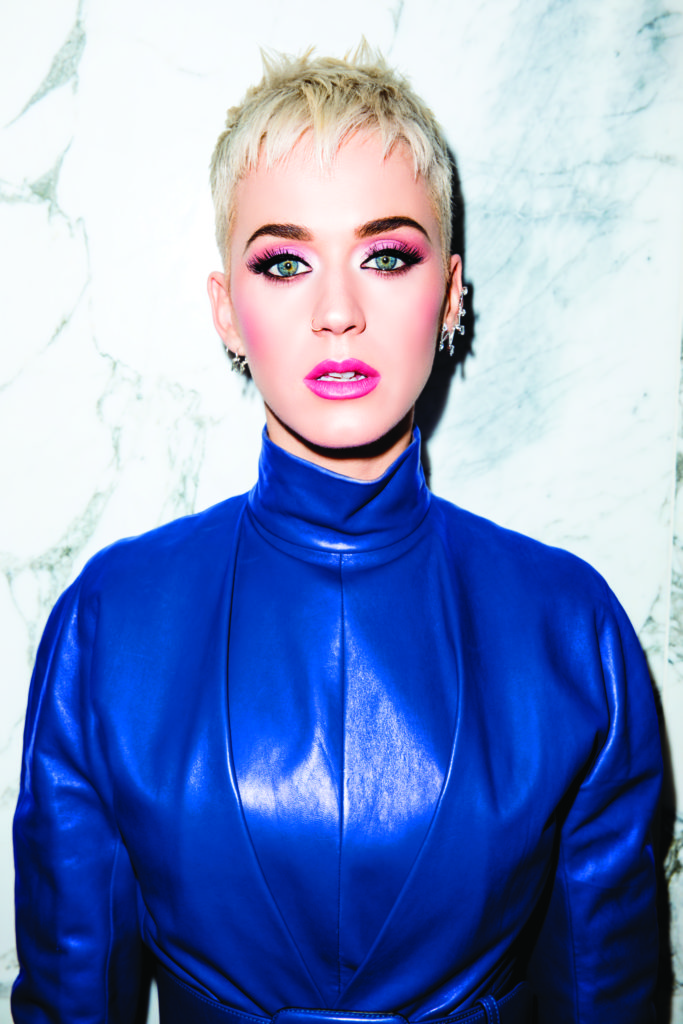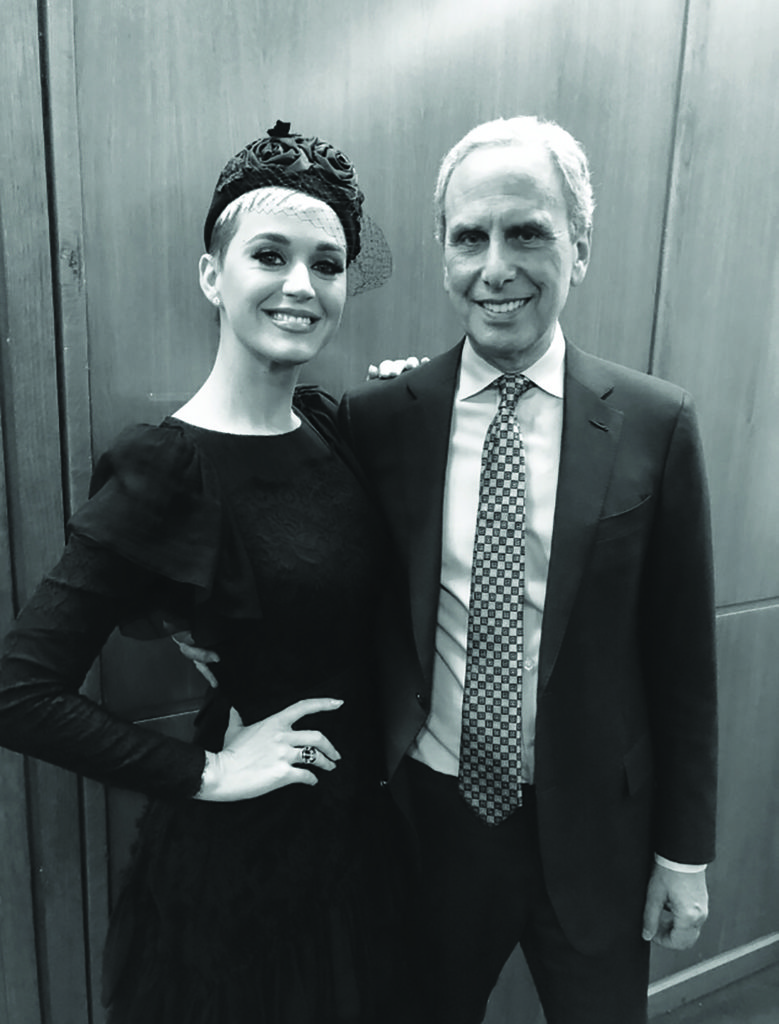
BOB ROTH: I want to hear from you why it would be that someone who is dynamic and has so many pressures, demands and desires in her life would take time out—20 minutes—to meditate. Why do you meditate?
KATY PERRY: Great question. I meditate just like so many of us. We are busy with our personal lives, with our careers. And for me, I have always been an executive multitasker, even before I had the opportunity of having a great career. I was driving, eating a cheeseburger, putting on my lipstick, all at the same time.
BR: To the great distress of the Los Angeles police. [laughs]
KP: Yes I’ve always had a lot on my plate, and I noticed before I was meditating I started to short circuit a little bit, like an iPhone when it just decides to stop and turn off on you, and you’re like, ‘I was in the middle of something!’ So I knew that I had to take care of my mental health and my mind, which is the greatest asset in my body besides my heart. I knew I had to protect it. And you were able to teach me meditation in India, and the stillness that I found is beyond anything I’ve ever experienced. It’s way different than napping. Everybody is like, well, I’ll just nap for two hours. And this is totally different than that. Napping is to brushing your teeth as flossing is to meditation. A lot of people brush their teeth, but still have very interesting breath. So you’ve got to get the plaque out!
BR: From my side, I want to say, one of the one of the reasons why I love you so much is not just because you’re here to talk about this, but because when you’re talking about meditation, TM, we’re talking about something that costs next to nothing, and we need to let people know. We need to break down some of the boundaries, the misunderstandings about TM meditation, and meditation in general. And this being a nonprofit, there is no huge multibillion-dollar ad campaign. It’s word of mouth, and a hundred million people really trust Katy Perry. So I am very grateful to you. Because of your words, 600,000 young kids have learned to meditate. Because of your words you have saved, no exaggeration, thousands and thousands of lives.
KP: Words are very powerful. God created the world with words.
BR: Yes. What do you say to someone when they say, ‘Well, this is a religion’? I mean, I’ve seen people wear slogans on their shirt that says ‘CrossFit is a religion.’ Anyone can make something a religion and label it. I think it’s about as religious as eating good foods or exercising for your body.
KP: I was raised in a Christian household. My parents are both traveling ministers, so I was raised around the idea that our body is a temple. And I think if our body is truly a temple, we have to take care of the mind, body and soul. And this takes care of your mind. I noticed when I meditate that my whole brain kind of opens up; it feels like a halo is ignited around my head, and it’s like I’m clearing out the cobwebs of my neural pathways and finding new neural pathways to ignite. It’s some of the most incredible stillness. And I would also say it brings some of the best, most creative ideas to the surface for me, especially when I come out of it. But I believe that if it’s really just to take care of your temple, then sign me up.

BR: A few years ago, the University of Chicago Crime Lab were very concerned about Chicago’s high rate of violent crime. Children were going to schools where they had to sleep in bathtubs because of the bullets that could come through the walls, and so they asked, ‘Does anybody have anything that we can do to reduce violence and arrests in the public schools?’ And 230 nonprofit organizations submitted proposals, and the crime lab accepted three. The David Lynch Foundation was one of those three. In the first year, they gave us $300,000 to do a program with a few schools and teach the kids what we called Quiet Time. Last year, they increased that to another $1 million.
The results were so significant, this year the budget is for $2.6 million. The preliminary indications are a significant reduction in arrests among meditating school kids during the summer months. This is major, because it’s the old school-to-prison pipeline if a child is stressed and anxious. What we’re doing is just giving them a tool they can learn so easily—no philosophy. I’m a raging skeptic. And you can be 100 percent skeptical and do this.
I remember one time a woman said to me, ‘Oh, my God, what is Transcendental Meditation—transcendental?’ First of all, it just means to transcend, which means to settle down, and she said, ‘How do you know when your 20 minutes are up?’ I said, ‘Look at your watch. We aren’t going anywhere, we’re just settling down.’ As a youngster I worked for Bobby Kennedy. I wanted to be a United States senator like Bobby Kennedy. I wanted to change the world.
KP: You are!
BR: I thought it was going to be through politics. But then I realized politics was never going to heal the soul of the nation. So I learned to meditate. My first experience after learning this wasn’t, Oh I want to get enlightened; my first experience was, I want to bring this to inner-city schoolkids. That was June 28, 1969. And I have been very fulfilled in now getting to the point where you can talk about meditation.
KP: I think it’s wonderful—the call that you heard, and then that you followed through. It’s very admirable to be so dedicated to something in service of others. For me, I love young people. Honestly if I didn’t know how old I was…I’d probably be, like, maybe 21. I was 13 for a really long time…
BR: I was thinking 6.
KP: 6? No, 7—I’m definitely conscious. And I just love people in general and I see them, I feel them. I’m a total empath and I see how stressed they are by their devices, by their keeping up with appearances, by wanting to emulate what they see online, on Instagram, Facebook, SnapChat. I wake up and I do this before I do anything, most of the time…and to have this [phone] in your hand for 12 to 13 hours out of the day, to always be continually on call. A lot of these kids don’t remember what it’s like to live a life without the internet, without posting. The 10-, 11-, 12-, 13-year-olds are like, we don’t know what CDs are. I never thought I would say that; I’m sounding like my mother. I feel so much for them, and I know that meditation has been such an incredible tool to find, for me, that I want to disconnect to connect back with myself. And it’s really important to have that tool, to have that quiet time in these schools for these kids to be able to retain focus, which is at an all-time low. To be able to know themselves, to find their true authentic selves, which is being advertised to them in multitudes of ways, thousands of times a day. I really feel that they are…
BR: Of not their authentic selves.
KP: Of not their authentic selves. There’s a struggle, so anything we can do—and I find personally with my own experience, meditation is the key to really finding your true authentic self. Finding that stillness. Recharging, having the mental strength, the physical strength and immune strength, to be able to take on this big, technical, technological world.
BR: You said something very interesting to me in regard to meditation—you said getting to the top was difficult, but staying at the top is really hard. And that meditation has helped you stay at the top.
KP: Your problems don’t go away once you have the spotlight and the success; they’re just magnified under a very large microscope. I’m living my life and I’m so grateful for the opportunity I get, and the spotlight through which I am able to share it. But I’m just being human, because that’s all I can be. And so I do make mistakes in front of the public, and I do feel like sometimes the kids get to learn through me making my mistakes, through the different mess-ups, and I admit to them, especially when I do it to them. But I’m really grateful. It’s a lot of attention. But God won’t give me more than I can handle.
BR: Your voice is very important.
KP: I just want to be a messenger, and this is one of the greatest messages I was able to receive.



